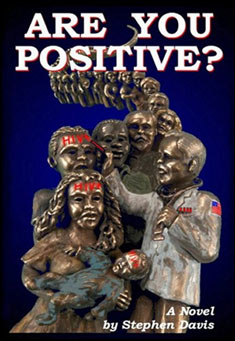Ripped from the headlines of today's news, "Are You Positive?" is a fictitious courtroom drama in the style of John Grisham. 26-year-old Tyree Johnson stands accused of first degree murder in Greenville, South Carolina. But his murder weapon is not a gun or a knife; it's HIV.
"A masterpiece ... such straight-forward, easy to understand chapters that virtually read themselves. Very well done!" - Dr. Andrew Maniotis. "I'm almost speechless! FANTASTIC book!! I couldn't put it down." - Karri Stokely
Excerpt:
On November 1, 2011, the Arizona Tribune ran an article in their Sunday Feature section telling the story of Sarah Meadows, a health writer for the paper who lost her brother to AIDS in 1990. Sarah had been covering the AIDS trial in Phoenix, which had taken on a special meaning for her personally.
PHOENIX, AZ - The heart of her story is not unique. In fact, it is shared by hundreds of thousands of men and women who lost a loved one to AIDS in the last thirty years.
Sarah Meadows, born Sarah Noyes in Greenwich, Connecticut, 1967, was accustomed to the finer things in life. Her father was a well-known doctor, prominent in Republican politics both statewide and nationally. Her mother was a graduate of Wellesley College and had blue blood coursing through her veins. Sarah lacked for nothing, from comfort and money to the finest education and friends that money could buy.
It was a perfect life, an American dream come true; that is, until her senior year in high school, when her 15-year-old brother Greg announced that he was gay.
"My dream suddenly turned into a nightmare," Sarah recalls. "My parents simply couldn't deal with it. Most of my friends deserted me, like I had done something wrong. But worse than that, everyone abandoned Greg, as if he had leprosy."
Sarah was the only one who stood by her little brother, gently persuading her parents over the next year that homosexuality was not a disease or a curse, and easing him back into the family. She became his guardian, his mentor, his best friend.
When Sarah graduated and left home to attend Amherst College for a degree in Journalism, she made Greg promise to stay in Greenwich and finish his last two years of high school. Sarah would drive home every other weekend to visit Greg and support him. It meant that Sarah had virtually no social life for her entire freshman and much of her sophomore years.
"That was okay with me," Sarah admits. "I kind of slacked off in high school a little, didn't apply myself as I should have, and it was good to focus on my studies and on Greg and forget about sororities and boyfriends for a while. Besides, Greg would have done the same thing for me if the tables had been turned. There was no way I could just leave him hanging."
It was during Greg's senior year when the devastating news surfaced. It was a routine physical for life insurance his parents wanted to take out on him before he left for college, a simple blood test that normally means nothing.
"I remember when Greg called me to tell me he was HIV-positive. I was on a date, but ten minutes later I was driving south, hoping to get home before our parents found out." Sarah's voice gives only a hint of the desperation she felt at the time.
None of the rest of the family tested positive for HIV. Just Greg. He had three homosexual lovers, but they too all turned out to be HIV-negative.
"This was early 1988, and we weren't exactly sure what to do. Like an awful lot of people, we believed what we were being told by the 'experts' - that HIV caused AIDS, and that AIDS was always fatal - so we had no other choice but to accept the fact that Greg would be dead in two or three years unless the HIV could be stopped."
They took Greg to their family doctor. Then they took him to an AIDS specialist in New York City, and finally to the Mayo Clinic in Rochester. The story was the same everywhere.
"They all told Greg to start taking AZT, the drug that had been approved just the year before to treat AIDS." Sarah winces as she remembers. "They said it would kill the HIV and prevent him from getting AIDS, or at a minimum prolong his life. Since there was no contrary information being widely publicized, we had no reason to doubt this advice. It turns out that Greg was part of the first group of HIV-positives who had no symptoms of AIDS but were prescribed AZT anyway, despite assurances from the drug company to the FDA approval committee that they wouldn't do that. But we didn't know that!"
There were two problems, however. Greg hated taking pills. He always had. It had been a battle to try to get him to take vitamins when he was younger, and finally the family had given up. Apparently it wasn't some philosophical stand against drugs as much as a physical abhorrence to swallowing a pill. Or perhaps it was completely psychological. At any rate, he would choke violently anytime he tried.
The second problem was that Greg was in perfect health, and it was hard for him to believe he needed medication. Hard for anyone to believe, for that matter. Though not big into competitive team sports, Greg loved cycling and wanted to ride in Connecticut's annual 100-mile bkm/Steelcase Bike Tour to help raise money to fight MS that June.






